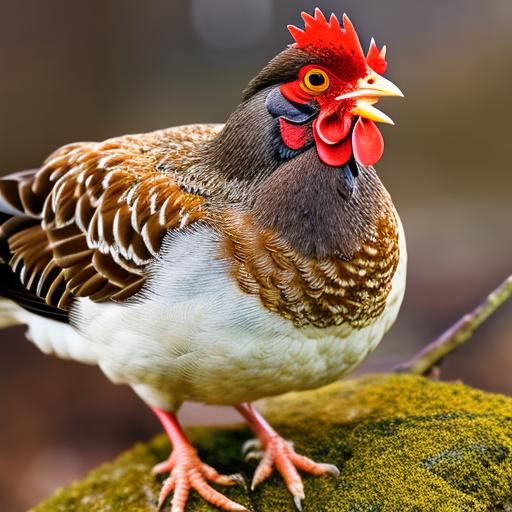Keeping chickens warm is an important aspect of raising backyard chickens, especially in colder climates. As the temperature drops, chickens are at risk of cold stress and hypothermia, which can be detrimental to their health and well-being. In this article, we will explore various methods for keeping chickens warm, including insulating and heating their coop. By understanding the need for warmth in chickens and implementing the right strategies, you can ensure that your feathered friends stay cozy and comfortable throughout the winter months.
Key Takeaways
- Chickens need warmth to stay healthy and productive.
- Chickens can keep themselves warm through fluffing their feathers and huddling together.
- Factors that affect a chicken’s ability to keep warm include age, breed, and health.
- A well-designed chicken coop can help keep chickens warm in cold climates.
- Insulating a chicken coop is a good way to keep chickens warm in winter, but heating may not always be necessary.
Understanding the Need for Warmth in Chickens
Chickens, like any other living creature, require warmth to survive. While they are equipped with feathers to provide some insulation, they still need additional heat in colder climates. Chickens are particularly susceptible to cold stress and hypothermia when temperatures drop below freezing. Cold stress occurs when a chicken’s body temperature drops below normal, causing them to shiver and huddle together in an attempt to generate heat. If left untreated, cold stress can lead to hypothermia, a potentially life-threatening condition.
How Do Chickens Keep Themselves Warm?
Chickens have natural ways of keeping themselves warm. One method is fluffing their feathers, which creates air pockets that act as insulation. They also huddle together in groups to share body heat. However, these methods may not be enough in extremely cold temperatures or for certain breeds of chickens that are less cold-hardy.
Factors That Affect a Chicken’s Ability to Keep Warm
Several factors can affect a chicken’s ability to stay warm. Age plays a role, as younger chickens are more susceptible to cold stress than older ones. Breed also plays a part, with some breeds being more cold-hardy than others. Additionally, the overall health of a chicken can impact its ability to regulate body temperature. Chickens that are sick or malnourished may struggle more in colder temperatures. It’s important to monitor these factors and provide extra help to chickens that may need it.
The Role of the Chicken Coop in Keeping Chickens Warm
The chicken coop plays a crucial role in keeping chickens warm during the winter months. A well-designed coop should provide insulation and proper ventilation. Insulation helps to retain heat and prevent drafts, while ventilation ensures that moisture and ammonia from chicken waste are properly expelled. It’s important to strike a balance between insulation and ventilation to create a comfortable environment for your chickens.
Choosing the Right Chicken Coop for Cold Climates

When choosing a chicken coop for colder climates, there are several factors to consider. Look for a coop with thick walls that can provide insulation. A raised floor can also help prevent cold air from seeping in from the ground. Additionally, consider the size of the coop in relation to the number of chickens you have. Overcrowding can lead to increased moisture and ammonia levels, which can be detrimental to your chickens’ health.
Insulating Your Chicken Coop for Winter
Properly insulating your chicken coop is essential for keeping your chickens warm during the winter months. There are several materials you can use for insulation, such as straw, foam board, or even recycled denim insulation. Straw can be used as bedding material, providing an additional layer of insulation on the floor of the coop. Foam board can be attached to the walls and ceiling to prevent drafts. It’s important to ensure that any insulation materials used are non-toxic and safe for chickens.
Heating Your Chicken Coop: Pros and Cons
Heating your chicken coop is another option for keeping your chickens warm during the winter months. However, there are pros and cons to consider before deciding to heat your coop. The main advantage of heating is that it provides a consistent source of warmth, ensuring that your chickens stay comfortable even in extremely cold temperatures. However, heating can be expensive and may pose a fire hazard if not done properly. It’s important to use safe heating methods and monitor the temperature inside the coop to prevent overheating.
Alternative Methods to Keep Chickens Warm
In addition to insulation and heating, there are alternative methods you can use to keep your chickens warm. Heat lamps can be used to provide localized warmth in specific areas of the coop. Heated waterers can prevent water from freezing, ensuring that your chickens have access to fresh water at all times. However, it’s important to use these methods with caution, as they can also pose fire hazards if not used properly. Always follow manufacturer’s instructions and regularly check for any signs of damage or malfunction.
Ensuring Your Chickens Stay Warm and Healthy
Keeping chickens warm is crucial for their health and well-being, especially in colder climates. By understanding the need for warmth in chickens and implementing the right strategies, you can ensure that your feathered friends stay cozy and comfortable throughout the winter months. Whether it’s through proper insulation, heating, or alternative methods, taking the necessary steps to keep your chickens warm will help them thrive and stay healthy during the colder months.
If you’re interested in learning more about how chickens can keep themselves warm, you might also find this article on “Garden Chicken Coop” from Poultry Wizard informative. It discusses the importance of providing a suitable environment for chickens to thrive in your backyard. From choosing the right location to designing a cozy coop, this article offers valuable insights on creating a comfortable space for your feathered friends. Check it out here!
FAQs
What is the natural body temperature of a chicken?
The natural body temperature of a chicken is around 105°F (40.5°C).
Can chickens keep themselves warm in cold weather?
Yes, chickens can keep themselves warm in cold weather by fluffing up their feathers, huddling together, and roosting at night.
What is the ideal temperature range for chickens?
The ideal temperature range for chickens is between 50°F to 80°F (10°C to 27°C).
What happens if chickens get too cold?
If chickens get too cold, they may suffer from hypothermia, which can lead to decreased egg production, illness, and even death.
How can I help my chickens stay warm in cold weather?
You can help your chickens stay warm in cold weather by providing them with a draft-free coop, adding insulation, using heat lamps or heated waterers, and providing extra bedding.
Can chickens survive in extreme cold weather?
Chickens can survive in extreme cold weather as long as they have access to a warm and dry shelter, plenty of food and water, and protection from predators. However, it is important to monitor them closely and take extra precautions during severe weather conditions.
Meet Walter, the feathered-friend fanatic of Florida! Nestled in the sunshine state, Walter struts through life with his feathered companions, clucking his way to happiness. With a coop that’s fancier than a five-star hotel, he’s the Don Juan of the chicken world. When he’s not teaching his hens to do the cha-cha, you’ll find him in a heated debate with his prized rooster, Sir Clucks-a-Lot. Walter’s poultry passion is no yolk; he’s the sunny-side-up guy you never knew you needed in your flock of friends!







